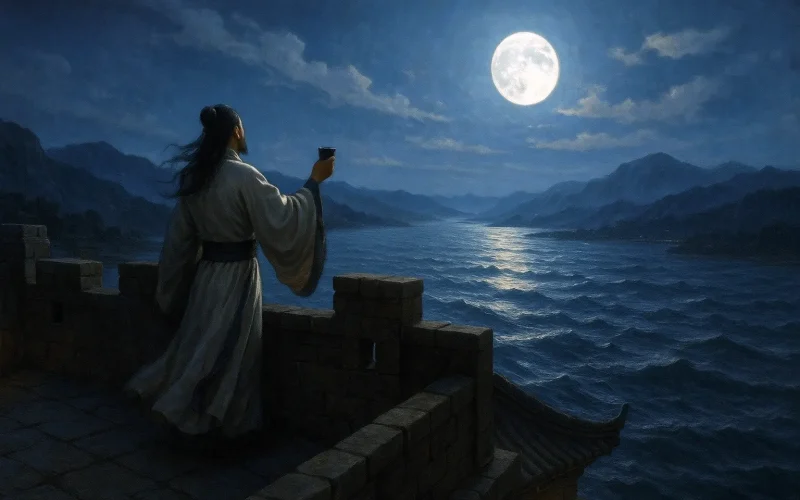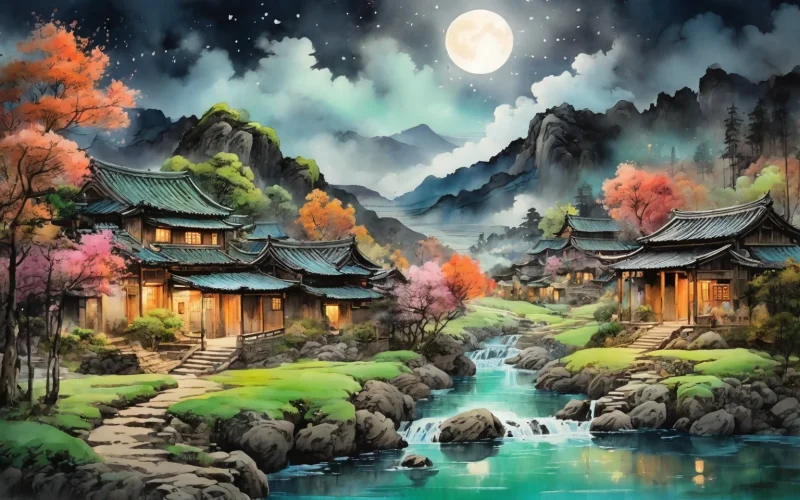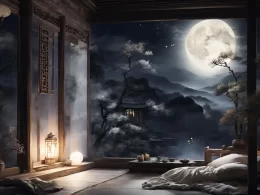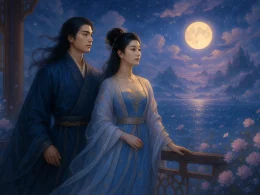The cool breeze blows on silent night in Town of Stone,
To view the south I mount the high tower alone.
White clouds and city walls mirrored on ripples swoon;
Dewdrops look like pearls dripping from the autumn moon.
Crooning long, I won't go back; drowned in moon rays;
How few are connoisseurs in my eyes since olden days!
Seeing the river crystal-clear and silver-white,
How I miss the unforgettable poet bright!
Original Poem
「金陵城西楼月下吟」
李白
金陵夜寂凉风发,独上高楼望吴越。
白云映水摇空城,白露垂珠滴秋月。
月下沉吟久不归,古来相接眼中稀。
解道澄江净如练,令人长忆谢玄晖。
Interpretation
This poem was composed in 744 AD, during the third year of the Tianbao era, when Li Bai, having been sidelined by powerful officials in the court, left Chang'an and wandered through various regions. Arriving in Jinling (modern-day Nanjing), he climbed the Sun Chu Tower at night and gazed into the distance. Facing the cool autumn night and the quiet riverside city, he was moved by the scenery, expressing not only his own loneliness and sense of displacement but also his deep admiration for the Southern Dynasties poet Xie Tiao (courtesy name Xuanhui).
First Couplet: “金陵夜寂凉风发,独上高楼望吴越。”
Jīn líng yè jì liáng fēng fā, dú shàng gāo lóu wàng wú yuè.
The night in Jinling is silent, and a cool breeze rises; I climb the high tower alone to gaze at the lands of Wu and Yue.
The poet sets the time, place, and atmosphere. The deep night and the autumn wind create a sense of solitude, hinting at the emotions he is about to express.
Second Couplet: “白云映水摇空城,白露垂珠滴秋月。”
Bái yún yìng shuǐ yáo kōng chéng, bái lù chuí zhū dī qiū yuè.
White clouds reflect on the water, making the empty city seem to sway; dewdrops hang like pearls, as if dripping from the autumn moon.
This couplet shifts from a downward gaze to an upward view, creating a vivid and dynamic autumn night scene. The verbs "sway" and "drip" animate the static scenery, enhancing the sense of emptiness and the poet's inner loneliness.
Third Couplet: “月下沉吟久不归,古来相接眼中稀。”
Yuè xià chén yín jiǔ bù guī, gǔ lái xiāng jiē yǎn zhōng xī.
Under the moon, I ponder for a long time, unwilling to return; since ancient times, true kindred spirits have been rare.
The poet reflects deeply, lamenting the vastness of the world and the rarity of true understanding. His sorrow over his current circumstances is intertwined with his admiration for the noble spirit of ancient figures.
Fourth Couplet: “解道澄江净如练,令人长忆谢玄晖。”
Jiě dào chéng jiāng jìng rú liàn, lìng rén cháng yì xiè xuán huī.
Only Xie Tiao truly understood the beauty of "a clear river pure as silk," making one long remember him.
The poet uses the scenery to express his feelings, referencing Xie Tiao's famous line "a clear river pure as silk" to convey his admiration for Xie's poetic style and character, while also expressing his own longing for a kindred spirit.
Overall Appreciation
The poem depicts the poet climbing the western tower of Jinling at night and gazing at the autumn scenery of Wu and Yue. Through the interplay of movement and stillness, the poet brings the riverside city to life, using Xie Tiao's poetry to deepen his own emotions. The poem's意境 (imagery) is lofty, and its tone is melancholic, reflecting both the poet's无奈 (helplessness) in his current circumstances and his admiration for past sages.
Writing Characteristics
- Scene and Emotion Intertwined: The poet uses the night scenery to create an atmosphere of emptiness, deepening the sense of his own solitude.
- Precise Word Choice: Verbs like "sway" and "drip" animate the static scenery, making the imagery more dynamic and evocative.
- Reflecting on the Past to Express the Present: By referencing Xie Tiao, the poet expresses his惆怅 (melancholy) over the rarity of true understanding, enriching the poem's意境 (imagery).
- Skillful Structure: The poem moves from scenery to emotion, building layer by layer and concluding with the remembrance of Xie Tiao, creating a cohesive and unified structure.
Insights
This poem not only showcases Li Bai's extraordinary imagination and artistic expression but also reflects his感慨 (reflections) on life. Faced with the magnificent landscape, the poet feels not joy but an intensified sense of loneliness, with the theme of finding a kindred spirit running throughout. This invites us to consider how rare true understanding is in life and how only culture and poetry can transcend time, connecting hearts across generations.
Poem translator
Xu Yuan-chong(许渊冲)
About the poet

Li Bai (李白), 701 - 762 A.D., whose ancestral home was in Gansu, was preceded by Li Guang, a general of the Han Dynasty. Tang poetry is one of the brightest constellations in the history of Chinese literature, and one of the brightest stars is Li Bai.











